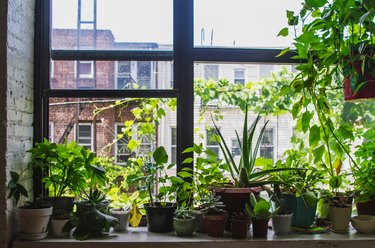
Ants in your garden can feel threatening. After all, they are insects and usually don't travel alone. When you see lines of ants heading up the sides of container plants or streaming into a garden bed, it can feel like an invasion. But stop and take a deep breath. The fact is, ants on plants or in the soil around plants often act as beneficial insects. They don't hurt your plants and can actually aid them. But if you want to reduce their numbers or nudge them into moving on, you have more than one option.
Ants in Plants
Video of the Day
Ants and plants seem to go together. If you have any sort of a garden at all, you'll probably see ants from time to time. This can include ants in potted plants, ants in landscape beds, and ants in your lawn. So what's a gardener to do?
Video of the Day
The first thing to do is reflect on the role ants play in a garden. Tunneling ants are little rototillers, aerating the soil like earthworms do and redistributing nutrients. They also help recycle by collecting dead insects and transforming them into soil nutrients. Ants also help disperse seeds, especially with flowering plants.
Ants aren't interested in munching your plants as some bugs do. Instead, they are looking for stem nectar. Some ant species get rid of plant-eating bugs that can harm your plants. Conversely, they also protect some insects, such as the caterpillars of some butterfly groups that produce a sweet substance known as honeydew. The ants love honeydew and look after the caterpillars until they become butterflies. In turn, ants serve as food for other beneficial insects, frogs, toads, birds and even some mammals.
Aphids Attract Ants
If your ants happen to be one of the few types that are bad for your garden, such as carpenter ants or stinging fire ants, you'll want to get rid of them. You may also want to reduce the population of regular ants in potted plants or house plants. One way to do this is to take out the aphids.
Although some caterpillars produce the honeydew ants love, much more is produced by aphids, a true type of nuisance bug in the garden. Just like ants herd and protect caterpillars that produce honeydew, they do the same with aphids. You want to get rid of aphids anyway because they suck out plant juices and damage plants. Just blast them off the plants with a hose or use a spray bottle with a mix of water and dish soap. Once the aphids are gone, the ant population will decrease significantly.
Pesticide for Ants in Plants
Perhaps the easiest method of getting rid of ants is to use pesticides such as ant bait stations. You buy them commercially and set them in the house or outside where ants are a problem. Ants die when they collect the bait from the station and take it back to the colony.
Getting Rid of Ants
If you don't want to turn to pesticides to control ants, there are various ways you can kill ants without chemicals. One natural ant killer for the garden is a substance called diatomaceous earth. This natural substance, available in hardware stores, kills ants without hurting plants. But you'll need to wash it off any harvested food after treatment. And, like other ways of killing ants, it is likely to kill other beneficial insects as well.